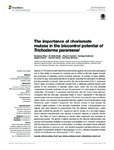Please use this identifier to cite or link to this item:
http://www.alice.cnptia.embrapa.br/alice/handle/doc/1032746| Title: | The importance of chorismate mutase in the biocontrol potential of Trichoderma parareesei. |
| Authors: | PÉREZ, E.  RUBIO, M. B.   CARDOZA, R. E.   GUTIÉRREZ, S.   BETTIOL, W.   MONTE, E.   HERMOSA, R.   |
| Affiliation: | ESCLAUDYS PEREZ, Universidad de Salamanca; MARIA BELEN RUBIO, Universidad de Salamanca; ROSA ELENA CARDOSA, Universidad de León; SANTIAGO GUTIERREZ, Universidad de León; WAGNER BETTIOL, CNPMA; ENRIQUE MONTE, Universidad de Salamanca; ROSA HERMOSA, Universidad de Salamanca. |
| Date Issued: | 2015 |
| Citation: | Frontiers in Microbiology, Lausanne, v. 6, 2015. Article 1181. |
| Pages: | 14 p. |
| Description: | Species of Trichoderma exert direct biocontrol activity against soil-borne plant pathogens due to their ability to compete for nutrients and to inhibit or kill their targets through the production of antibiotics and/or hydrolytic enzymes. In addition to these abilities, Trichoderma spp. have beneficial effects for plants, including the stimulation of defenses and the promotion of growth. Here we study the role in biocontrol of the T. parareesei Tparo7 gene, encoding a chorismate mutase (CM), a shikimate pathway branch point leading to the production of aromatic amino acids, which are not only essential components of protein synthesis but also the precursors of a wide range of secondary metabolites. We isolated T. parareesei transformants with the Tparo7 gene silenced. Compared with the wild-type, decreased levels of Tparo7 expression in the silenced transformants were accompanied by reduced CM activity, lower growth rates on different culture media, and reduced mycoparasitic behavior against the phytopathogenic fungi Rhizoctonia solani, Fusarium oxysporum and Botrytis cinerea in dual cultures. By contrast, higher amounts of the aromatic metabolites tyrosol, 2-phenylethanol and salicylic acid were detected in supernatants from the silenced transformants, which were able to inhibit the growth of F. oxysporum and B. cinerea. In in vitro plant assays, Tparo7-silenced transformants also showed a reduced capacity to colonize tomato roots. The effect of Tparo7-silencing on tomato plant responses was examined in greenhouse assays. The growth of plants colonized by the silenced transformants was reduced and the plants exhibited an increased susceptibility to B. cinerea in comparison with the responses observed for control plants. In addition, the plants turned yellowish and were defective in jasmonic acid- and ethylene-regulated signaling pathways which was seen by expression analysis of lipoxygenase 1 (LOX1), ethylene-insensitive protein 2 (EIN2) and pathogenesis-related protein 1 (PR-1) genes. |
| Thesagro: | Trichoderma Controle biológico |
| NAL Thesaurus: | Shikimate pathway Gene silencing Antifungal agents Phenylethyl alcohol Salicylic acid |
| Keywords: | Tparo7 gene 2-phenylethanol Tyrosol |
| ISBN: | http://dx.doi.org/10.3389/fmicb.2015.01181 |
| Type of Material: | Artigo de periódico |
| Access: | openAccess |
| Appears in Collections: | Artigo em periódico indexado (CNPMA)  |
Files in This Item:
| File | Description | Size | Format | |
|---|---|---|---|---|
| 2015AP28.pdf | 2.27 MB | Adobe PDF |  View/Open |









